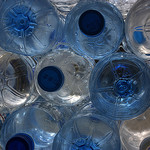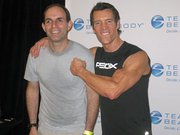 |
| Photo by Klearchos Kapoutsis |
It’s summertime in the northern hemisphere, and when the weather gets warmer, physically active people give more thought to staying hydrated, often using sports drinks to replace electrolytes (sodium, potassium, and other minerals) lost through sweat. At least, that has been the conventional wisdom for the past few decades. Over the past year, the Ben Greenfield Fitness podcast has interviewed Dr. Timothy Noakes on two occasions, related to the topic of staying properly hydrated during endurance sports. The focus on endurance sports is related to Ben Greenfield’s roles as a triathlete and sports trainer, but the principles discussed can be applied to anyone who hears the message to “drink more water” and wonders if those sports drink are worth the money.
How Much Should I Drink During Exercise? What About Electrolytes?
In the first interview, titled The Death of Gatorade (Should you stop using electrolytes during exercise?), Ben introduces Dr. Noakes as an expert in exercise science, and an endurance athlete in his own right. Dr. Noakes said that as recently as the 1960s, the opinion in sports medicine was that drinking water while running was a bad idea, and that the need to drink was a sign of weakness. In the late 1960s, some researchers began to promote the idea of drinking a recommended quantity of water, about a liter of water per hour of running. For the next 10 years or so, Dr. Noakes himself went along with the increasingly popular idea that runners should drink as often as possible, and there was no such thing as too much water consumption during a race. Unfortunately, in 1981, he encountered a situation where a woman running a 56-mile race experienced symptoms which were thought to be related to dehydration. When they rushed her to the hospital, they found that in fact, her blood sodium level concentration had dropped dangerously low due to excessive water intake and retention. This condition is known as water intoxication, or hyponatremia.
Note that the definition I linked above (from chemistry.about.com) mentions that one of the factors leading to hyponatremia is “when a dehydrated person drinks too much water without the accompanying electrolytes.” Dr. Noakes would dispute this description, saying that the real issue is drinking too much water compared to the amount that is actually lost during physical activity. The idea of electrolyte intake has been heavily promoted since the mid-1980s, when Gatorade and other sports drinks became mainstream (and highly advertised) products. Dr. Noakes addresses this in greater detail in the follow-up interview (as well as his book Waterlogged), but to summarize, his research shows that the body maintains its own storage of sodium and other electrolytes very well. If you can taste salt in your sweat, you don’t need a sports drink!
Dr. Noakes’ recommendation for water intake is far below the 1996 recommendation of the American College of Sports Medicine, which is “as much as tolerable” or up to 1.2 liters (40 ounces) of water per hour. In contrast, Dr. Noakes says that drinking according to your thirst (no more, no less) is the best thing to do, both for your performance and your general health.
For more details, I would recommend listening to the podcast (at Ben Greenfield Fitness or iTunes). There is also a full transcript available.
Common Sense vs The Sports Drink Industry?
In the podcast episode Waterlogged (How you’re being manipulated by the sports drink industry, and what to do about it), Ben Greenfield interviews Dr. Noakes again, this time to discuss his new book Waterlogged: The Serious Problem of Overhydration in Endurance Sports (hence the podcast episode title), which he had mentioned in the earlier interview as “an upcoming book about the fluid intake and sodium connection,” without further details. Now that the book is available, Dr. Noakes has documented what he recommends for athletes and others who are concerned about proper water and electrolyte balance. Here are some quick tips from the podcast show notes:
- Your body will tell you what it needs. Just listen.
- Drink ad libitum, according to the dictates of thirst.
- No studies have ever shown that dehydration contributes in any way to any illnesses associated with prolonged exercise like marathons, triathlons, cycling events or ultra-runs.
- There is zero need to increase your habitual daily sodium intake above that dictated by your appetite.
- There is no need to ingest additional sodium during exercise.
- Much of what you believe about your personal well-being is the result of targeted manipulations by industries who principal focus is their commercial fitness and not necessarily your health and safety.
I was fascinated to learn that the body stores sodium and uses or eliminates it as needed, based on your intake from food and drink the day before. Unless you are on a sodium-restricted diet, there is no need to be concerned about sodium loss, even during extreme exercise sessions, because your body will keep what it needs and eliminate the excess.
Again, I would recommend listening to the podcast for all the details, and reading Waterlogged
for even more in-depth discussion of this topic.
Related Links
The Central Governor Theory: Another podcast with Ben Greenfield and Dr. Noakes. Tap into your body’s hidden endurance potential!
Books by Timothy Noakes (Amazon.com)


